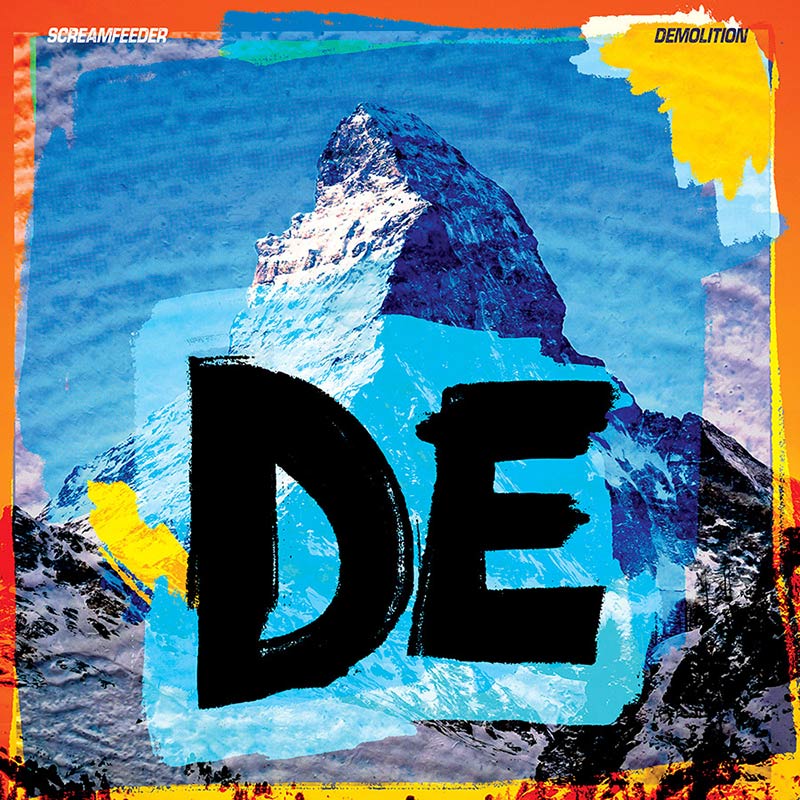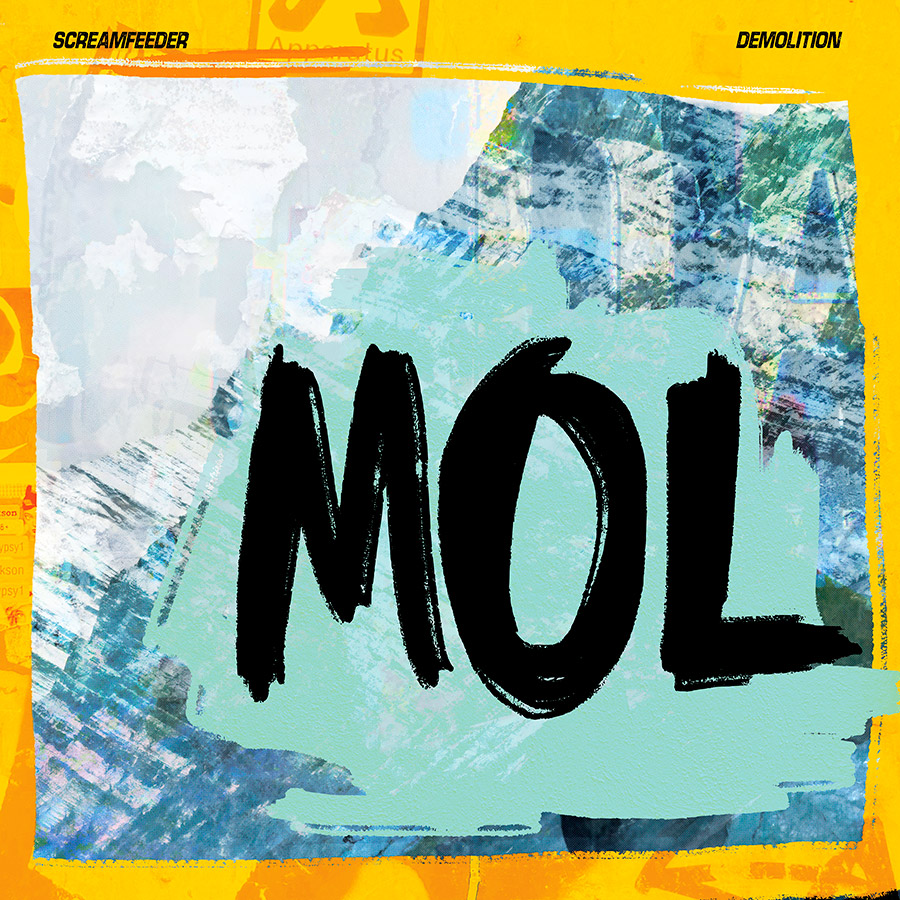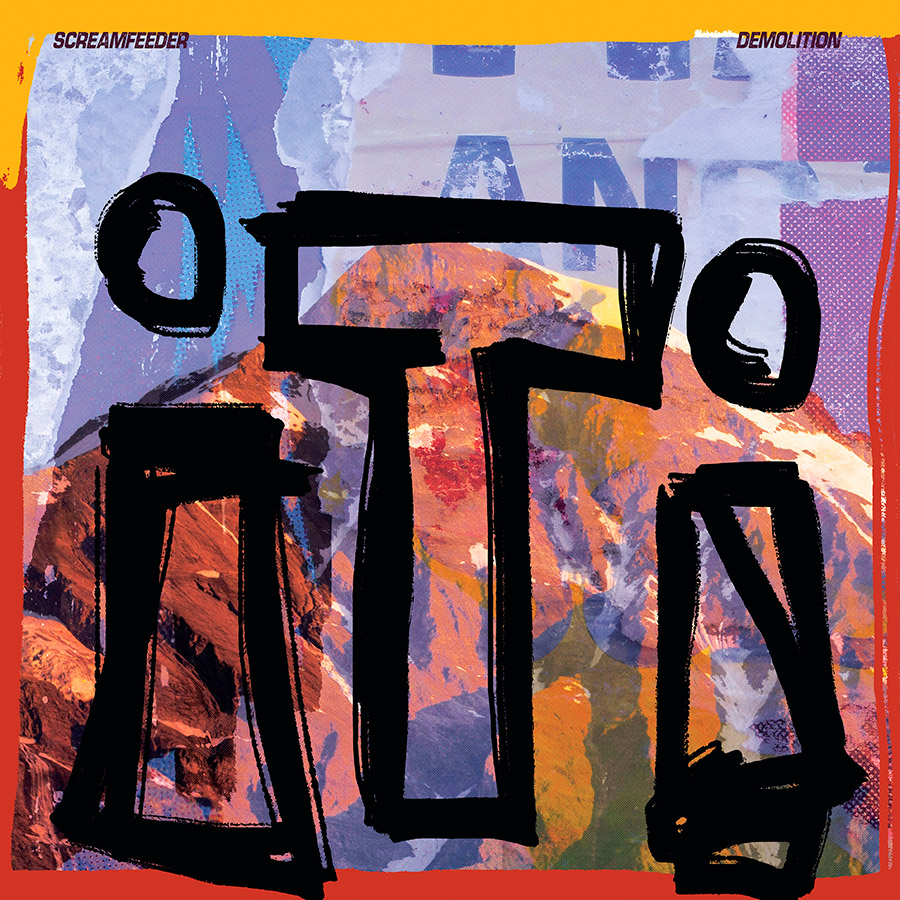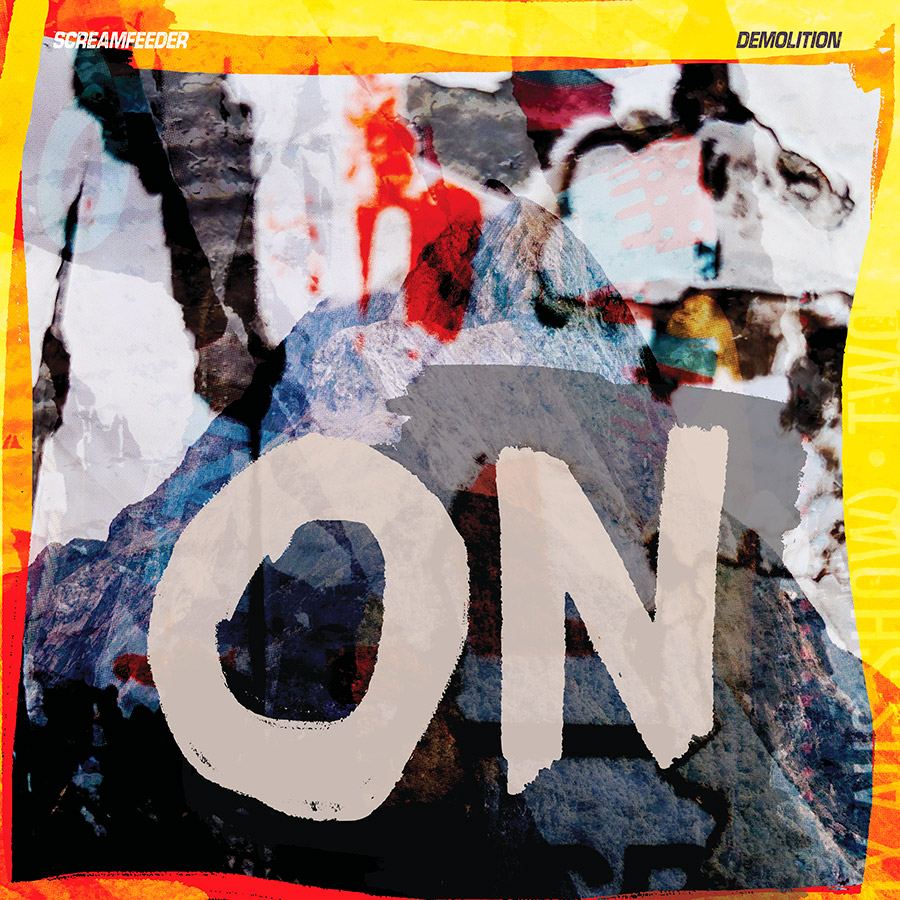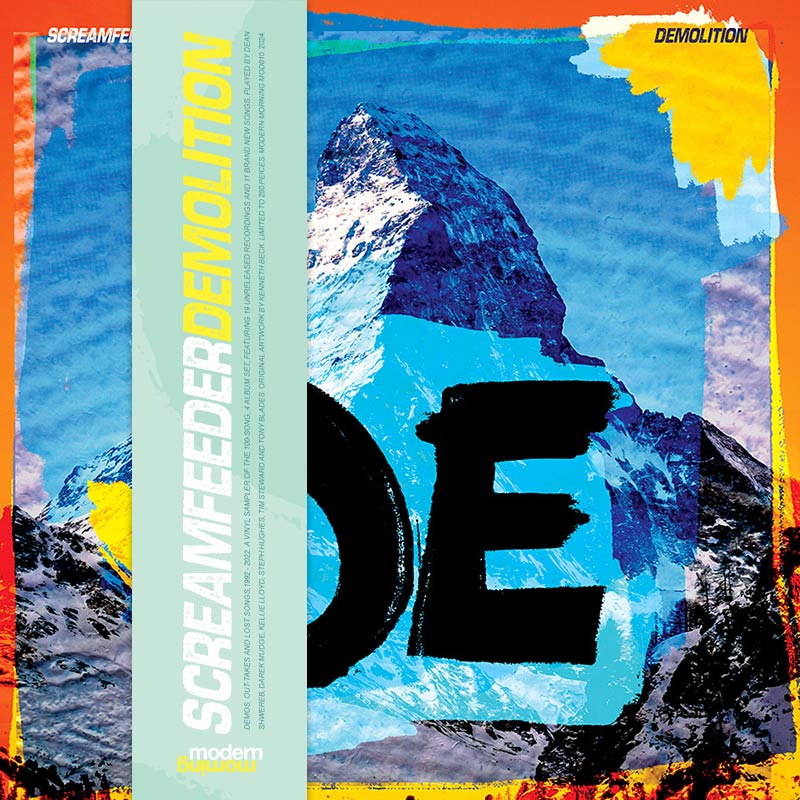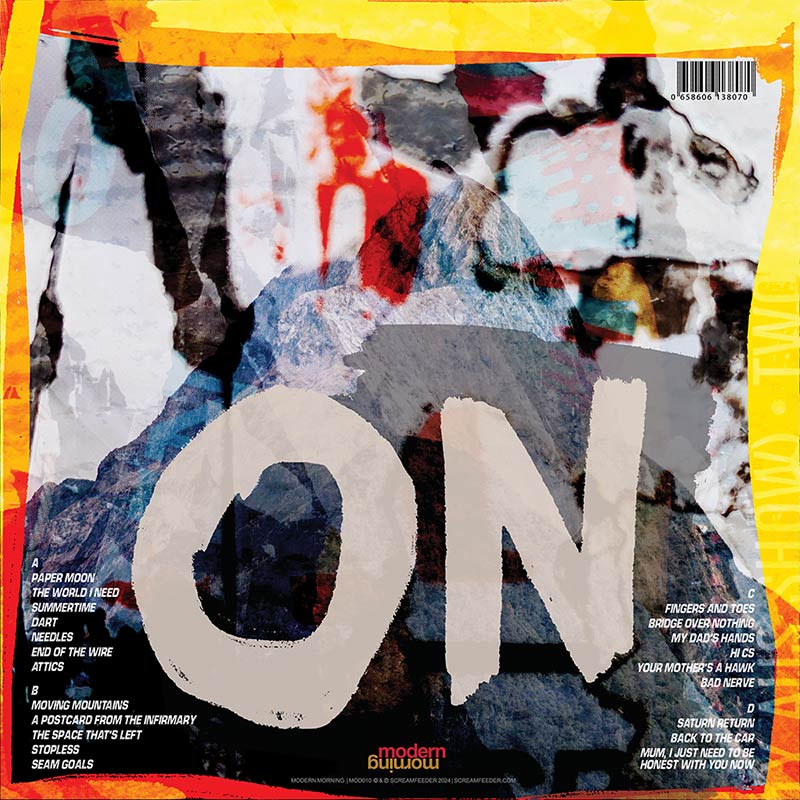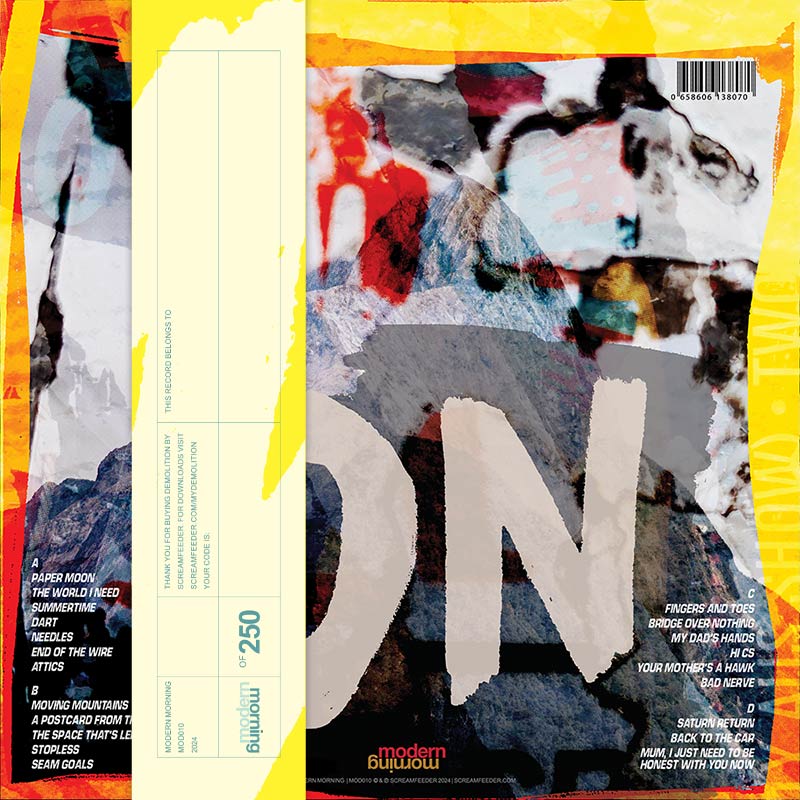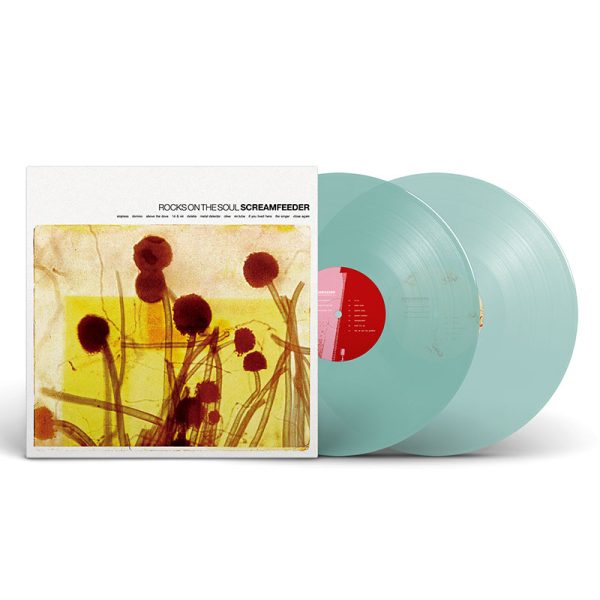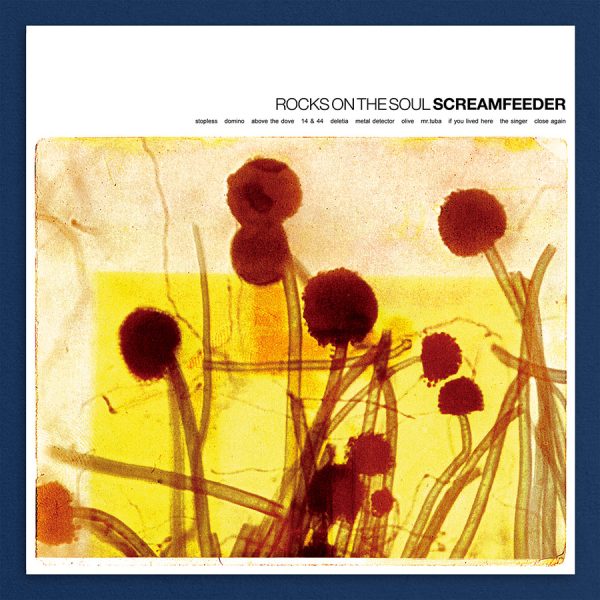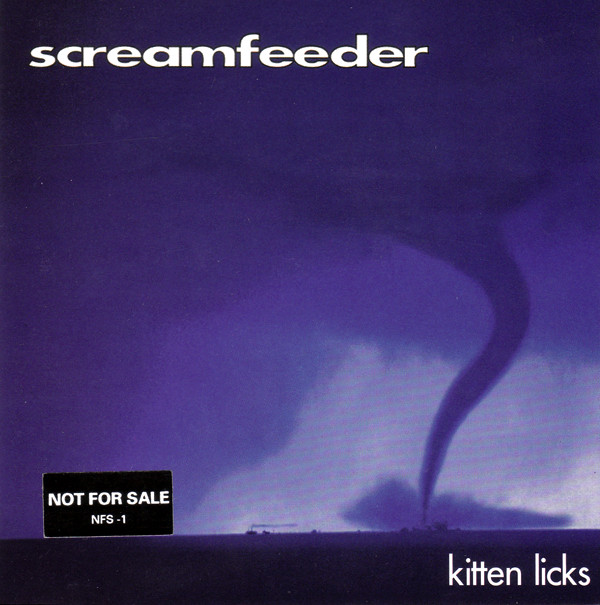Feb 14, 2025. Modern Morning MOD010, MOD011, MOD012, MOD013.
Artwork by Kenneth Beck.
You will not like all of this album.
If you’re into music that’s well-recorded and mixed, well-sung, well-played, balanced and polished, stay well clear.
Bands make a lot more music than you hear on their official releases. They’re forever recording ideas, jams and sketches of songs on phones and computers (now) as well as cassette recorders and 4 track machines (then), in practice rooms, in bedrooms, and in demo studios. They hardly ever bother with more than one take, of anything. Songs are sketches, and they’re mixed fast and loose and dirty.
- 48 demo versions of songs which were later recorded properly and released.
- 25 “new” songs which were never released – until now.
- 32 instrumentals – never released.
All filler, no killer.
This is our collection of demos from between 1992 and 2022. 100 songs over a four album digital set, and a double vinyl album featuring 21 of the most listenable tracks. No one will like all of Demolition, but if you’re into music which is muddy, distorted, odd, noisy, weirdly arranged and sketchily performed, there just might be something for you.
We’re opening the door and inviting you into the practice room to hear what it’s really like throwing ideas at the wall, putting songs together and taking them apart again, remodelling them until they either work, or they just break. A lot of these songs were always destined for the bin, and rightly so; others evolved into real Screamfeeder songs and ended up getting recorded with care.
Good luck with Demolition.
Buy
Volume 1
- Paper Moon
- The World I Need
- Papoose
- Unwound
- Bunny (demo)
- Don’t Get Me Started (demo)
- Going to california (demo)
- Same Mistakes Again (demo)
- Keys Riff
- Dart (demo)
- No Past Tense (demo)
- Cheese Melt
- I Don’t Know What To Do Any More (demo)
- Better
- Deborah Triangle
- Summer Rat (demo)
- Empty The House
- Rowena
- I’ve Got The Knife (demo)
- Start Again From Here (demo)
- Needles (demo)
- On The Offchance
- Summertime (demo)
- Attics
- Hi Cs (demo)
Volume 2
- Seam Goals
- Shelter (demo)
- Airlift King (demo)
- Making It Up (demo)
- Got A Good Reason
- Stopless (demo)
- Already Too Late
- Olive (demo)
- When Science Breaks
- Bouncy Keys
- Try To Find Us (demo)
- You & Me (demo)
- Hide
- The Night Rolls Out
- Not Afraid (demo)
- Disco Pilot
- Outers (demo)
- If You Lived Here (demo)
- Back To The Car
- Tom Burns Bridge
- Slipping
- Weird Bass
- Saturn Return
- Moving Mountains
- A Thousand Cuts
Volume 3
- My Dad’s Hands (demo)
- Lip Gloss
- Night Wolf of Death
- Above the Dove (demo)
- Mr Tuba (demo)
- Got a Feeling (demo)
- Back to the City
- Your Mother’s a Hawk
- Bridge Over Nothing (demo)
- Fingers & Toes (demo)
- Close Again (demo)
- Howls
- Too Bored
- On a Plane (demo 1)
- End of the Wire (demo)
- Blue (demo)
- Ice Patrol (demo)
- Now Now Now Bomp Bomp Bomp
- Terminal (demo)
- Triple Hook (demo)
- Around a Pole (demo)
- Needles (demo 2)
- Half Lies (demo)
- The Singer (demo)
- Bad Nerve
Volume 4
- Irma
- Hanging Around With You
- On a Plane (Demo 2)
- Make it Wait
- All the Times
- If I Know You
- Forget Me Often
- Serafini Chains
- Declawed
- Late To The Party (Demo)
- Burn It Dead
- Come & Get Me
- Medicine
- A Postcard From The Infirmary
- Dots
- Falling (Demo)
- Disco Pilot Dub
- Western Highway
- No Traffic
- Break It Clean (Demo)
- Campfire (Demo)
- As Close As We Will Get
- Cheese Melt 2
- Fuzz
- Nothing To Believe
- Lenny
- Weird Rock
- Not Coming Home
- Weight & Speed
- Mum, I Just Need To Be Honest With You Now
In art theory, the sketch holds a place of immediacy and intimacy, functioning as a rapidly executed freehand drawing not intended as a finished work. It provides a quick way to graphically record an impression, idea, or principle.
The role of a demo for a songwriter serves a similar aesthetic purpose. Both the sketch and the demo are often presented as underdeveloped ideas, raw and lacking the polish of a fully realised, potentially big-budget production. This narrative emphasises the initial, nascent stage of the creative seed before its authors nurture and develop it.
People, for various reasons, enjoy this perspective and become entangled in intellectual thought exercises about it, completely missing the transcendence of the sketch and the demo, while keeping it in a diminished state of importance, holding little value. It is a great failing of consumerism that the sketch and the demo are not seen as the ultimate expressions of artistic creation.
They are more than just the seeds of larger ideas; they represent the purest form of creativity, when the artist surrenders to the moment and allows the honest reality of their emotions to pour forth in a cathartic release, honouring the tradition of automatic writing.
Automatic writing, also known as psychography, is the practice of writing without conscious intent or awareness, often viewed through spiritual, psychological, or creative lenses. Some believe it facilitates communication with spirits, while others see it as a means of accessing the subconscious mind. Regardless of interpretation, the writer allows their hand to move freely, producing text that may reveal hidden thoughts or generate creative inspiration. While comparing songwriting to such a spiritual process might seem like myth-building, it’s the closest analogy to explain its mystery.
Hard work and skill can only take a songwriter so far; sometimes, in moments of surrender, a song arrives through them. If that moment is captured and recorded, the final product, refined and released, is forever marked by that initial spark of creation. This is why so many songwriters cherish their demos: even if a song is later recorded with better production and more interesting arrangements, nothing can ever replicate the first spiritual, emotional, and physical rush of its demo.
Screamfeeder boasts two of the finest songwriters in the known universe: Kellie Lloyd and Tim Steward. Their dynamic partnership has gifted us countless indie rock anthems, and over the past 34 years, their rich catalogue of songs has inspired many to form bands and become songwriters themselves. I’m a testament to this influence. Hearing “Static” on Triple J while coming of age in 1997 was life-changing. The opening lines—“I’m going to build a radio with static from the stars / and broadcast at a frequency you’ll pick up in your cars / I’m setting out on airwaves where I will feel right at home / I’m going to call it nothing because you don’t need to be known”—resonated deeply with my yearning to escape teenage alienation. “Static” achieved this and more, perfectly capturing the beauty of otherness and the blissful momentum of its unifying power, in the way only a pop melody infused with punk spirit can.
This influence continued into my twenties, when a song like “Stopless” became the voice of my complex emotions as I struggled with identity and the meaning of adulthood. The lines “I’ve been having weird dreams again / I just wanna have the one where I win / all the times they’ve said this job’s for you / some dss guy wouldn’t have a clue / of what I will achieve in my life / it’s not some 9-5 thing or a house wife / not that any of those things are bad / it’s just never been a dream the I’ve had / I’ve got a dark ambition in me / I will be independent and free / and all the stupid things I’ve done / i’ll never have to do them again” became a mantra, a melody that offered defiance even as everyone tried to guide me toward conventional modern living. It’s one of those rare songs that demands quiet contemplation but, in return, changes your life, delivering you from pain and easing suffering.
These two songs exemplify the diverse moods and textures within Screamfeeder’s sound. While one might argue that “Static” is Tim’s signature song and “Stopless” is Kellie’s, they are simply excellent starting points for experiencing these two prolific songwriters. Many of their songs have been released and are readily available, but now, for the first time, we gain an even more intimate glimpse into the songwriting of Tim and Kellie, and of Screamfeeder as a whole, with their new 105-song anthology, “Demolition” digitally released on February 14, 2025. Divided into four parts and spanning demos recorded between 1992 and 2002, “Demolition” is an exercise in patience, revealing Tim and Kellie’s journey as songwriters. We witness sketches beginning their path toward full realisation.
While some of these songs may be familiar, much of the material is new and deserves to be consumed attentively, without distraction. “Demolition” should be appreciated as a work of art, a historical monument to the sacred cathedral that is Screamfeeder and their music.
Spread across four volumes, “Demolition”explores the core moods and atmospheres that form the foundation of Screamfeeder’s sound. Volume One is brimming with bright pop hooks and the driving energy that underpins the band’s upbeat moments. It features early versions of hits like “Dart,” “Hi C’s,” “I’ve Got The Knife,” “Bunny,” and “I Don’t Know What To Do Anymore,” alongside later gems such as “Going To California” and “No Past Tense.” All these tracks sound urgent and full of excitement, allowing the listener to share in the band’s joy of creating and performing such glorious pop songs for the first time.
Then there’s “Attics,” a song deserving attention and a true lost masterpiece that would have fit comfortably on any Screamfeeder album. Instrumental in nature, “Attics” begs for a Tim and Kellie dual melody to realise its full potential—a glimpse of a possible future anthem, preserved here for fans to ponder what might have been. Volume One opens with the fiery “Paper Moon,” setting the pace with punk rock energy, but without the genres arrested development.
“Paper Moon’s” melodies are abundant and perfect for the cathartic dance moves that accompany moments of pure self-expression. “The World I Need,” another personal favourite, brilliantly showcases Tim’s ability to meld paragraphs of words into precise pop hooks, echoing the beat poet tradition with hip-hop timing, all while soaking in the grime and sunshine of a Brisbane summer’s dirge. “Empty The House” feels ready to go, its storytelling vibe resonating throughout the track. I suspect it suffered from feeling too complete in demo form, making it difficult to fully absorb and rework within the band room. The thrill of “Empty The House” is that we now get to experience its raw power and it for me is the real centrepiece of Volume one.
Volume Two largely celebrates the artistry of Kellie Lloyd, whose songwriting exemplifies an artist who understands how to harness the sacred energy and natural beauty of the ancient sadness that lives within all of us, channeling its all-encompassing spiritual, emotional, and physical mystery into song. The demo version of “Stopless” is even more emotionally raw than the studio version, grounded in the alienation from which it sprang, yet ready to soar with the bliss and escapism that characterise it as the opening track on their “Rocks On The Soul” record.
Even in its demo form, the song is pure feeling and sounds like a one-in-a-million creation, and one that holds a special place in the lives of many Screamfeeder fans. “The Night Rolls Out” captivated me with its swirling, moody guitar passages, both hypnotic and dissonant. This instrumental track has ample space for the right words, melody, and emotion to give it even greater depth. It’s a cinematic piece, showcasing a side of the band that occasionally surfaces, but here we experience it fully, once again amplifying the sense of wonder. “Tom Burns Bridge” echoes this same theme, focusing on the repetition of a set of gliding chords that provide a powerful platform for exploring yearning and aching.
The complexity of human emotions sometimes requires a form of self-expression that moves simply yet communicates volumes. Even as an instrumental, “Tom Burns Bridge” navigates this dichotomy, suggesting rather than declaring. “A Thousand Cuts” is my favourite track on this volume because it delves into the band’s weirder side, where they move away from pop hooks and explore more experimental areas of rock music. The groove anchors the song’s darkness, providing ample space for the guitars to move, while the bass cuts a direct path, rattling your core and guiding you to the emotional heart of what’s being communicated.
You can feel the band riding the moment, leaving me with the feeling that they should throw caution to the wind and make a few records like this song, because this sound suits them incredibly well. On “A Thousand Cuts,” the band members play with passionate spontaneity, reacting to each other and the music in real time. They’re “in the zone,” playing at their peak, making it the perfect conclusion to Volume Two.
Heavier and full of later classics and rarities, along with a few 1990s essentials, Volume Three returns to more familiar territory, featuring many demos of some of the group’s best songs. “Bridge Over Nothing” exemplifies Screamfeeder’s approach to heaviness: the pace relaxes, the guitars incorporate some sludge into their crunch and fuzz, and dissonant riffs erupt, avoiding the cliché of those self-serious musicians who don’t understand that the secret to heavy is to dial back the attack and glide—just glide.
I challenge you not to get excited when “Ice Patrol” appears; this song always puts me in a good mood, and this demo version is no different. The final track on this volume, another instrumental, is called “Bad Nerve.” It serves as a reminder of how stylistically versatile Screamfeeder can be. Here, they absorb the aesthetics of heavy noise rock without being constrained by the genre’s conventions. They make it their own, further illustrating what the group is capable of, even when pushing the boundaries of their core sound.
The final volume, Volume Four, best exemplifies what this entire anthology proposes. The level of insight within this particular volume borders on voyeurism for fans, as it reveals the group to be so much more than just a pop band. Whether these songs represent false starts or attempts at new directions, Volume Four captures the freedom and frustration of creativity, showing how sometimes the best path forward is through the complete destruction and deconstruction of one’s sound—a demolition, if you will.
These songs are the ultimate collection of sketches, demonstrating the breadth of Tim and Kellie’s creative exploration before finding the songs they seek. As any songwriter will tell you, and to borrow a pearl of wisdom from Nick Cave, writing songs is a bloody business (and not in the traditional sense of “business,” but rather a metaphorical massacre) where you must put in the work and marry the science and emotion of self-expression. If, like Screamfeeder, you have a legacy, then you are also, within the songwriting process, doing your best to both honour it and destroy it, avoiding repetition. That’s what Volume Four sounds like: the aftermath of such a massacre, where you go all in and await the survivors to surface, transforming them into songs.
Screamfeeder’s disclaimer regarding “Demolition” feels more like a warning than an invitation, and I understand why any songwriter would issue one. Opening up the vaults and sharing sketches and demos is the ultimate act of vulnerability for any artist. These songs are often raw and unpolished, revealing the artist’s creative process, including mistakes, experiments, and undeveloped ideas. It’s natural for doubt to replace pride when established songwriters share demos, because vulnerability, in this instance, means being open to criticism, judgment, or even ridicule.
By sharing these early-stage works, Screamfeeder expose themselves directly, revealing the messy, imperfect, and sometimes awkward stages of their creative process. It’s akin to showing someone your diary or the drafts of a novel before editing and finalisation. Sure, there is a risk of revealing flaws and imperfections, but also the potential for a deeper connection with the audience, who can gain a greater appreciation for the artists work by seeing its evolution. It takes courage and a willingness to be seen as imperfect, which is why it’s such a vulnerable act, and I believe that vulnerability is the power behind this collection of songs.
I had the thrill of listening to these songs in advance of their release. I sat and listened to the entire collection, first as a fan and then as a songwriter. Immersing myself in these songs was a truly joyful experience, allowing me to better understand and feel closer to the artistry of Screamfeeder, and particularly its two principal songwriters, Tim and Kellie. Some will undoubtedly say this is “one for the die-hard fans,” and while that sentiment holds some weight, it remains within the cliché of the obvious.
“Demolition” is a testament to the sacred craft of songwriting and a band that reigns supreme within the secret history of our local art and music community. It serves as a guide to how an artist achieves longevity and an ode to “the glimpse,” because just as these songs offer insight into Screamfeeder’s past, they also give us a chance to hear what the band is capable of in the future, as they delve deeper into the kind of freedom that comes from being an independent pop band for over 30 years. These recordings aren’t merely underdeveloped ideas; they are the purest expressions of creativity, capturing the initial spark, the “automatic writing” that precedes the polished final product. Screamfeeder’s willingness to open their vaults, as they have done with this anthology, offers a unique opportunity, letting us into the “bloody business” of their creativity that births the songs we cherish.
“Demolition” showcases the breadth of Screamfeeder’s artistry and the evolution of their sound, and in its raw and revealing form, transcends the simple presentation of sketches and demos. This gives these songs special value, offering a better understanding of the band while also preserving the mystery of their creative process. Now, with the vaults cleared, I imagine a new blank canvas awaits Tim and Kellie. With more years behind them than ahead, the demolition that comes from setting these songs free is about having the bravery, as they always have, and, in the spirit of David Lynch, of returning to the deepest part of the ocean in order to find the bigger fish.
Source article at Heavy and Weird Blog

